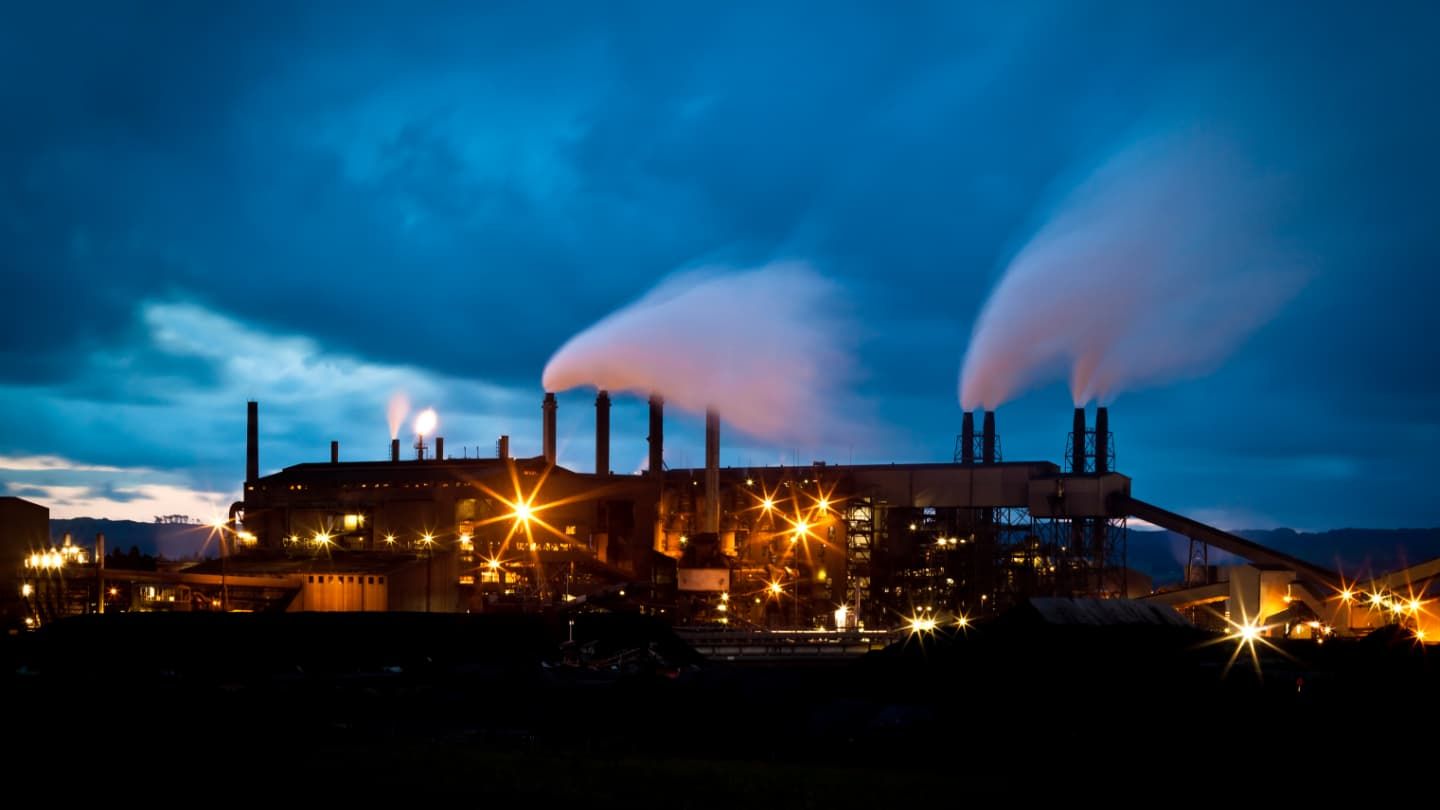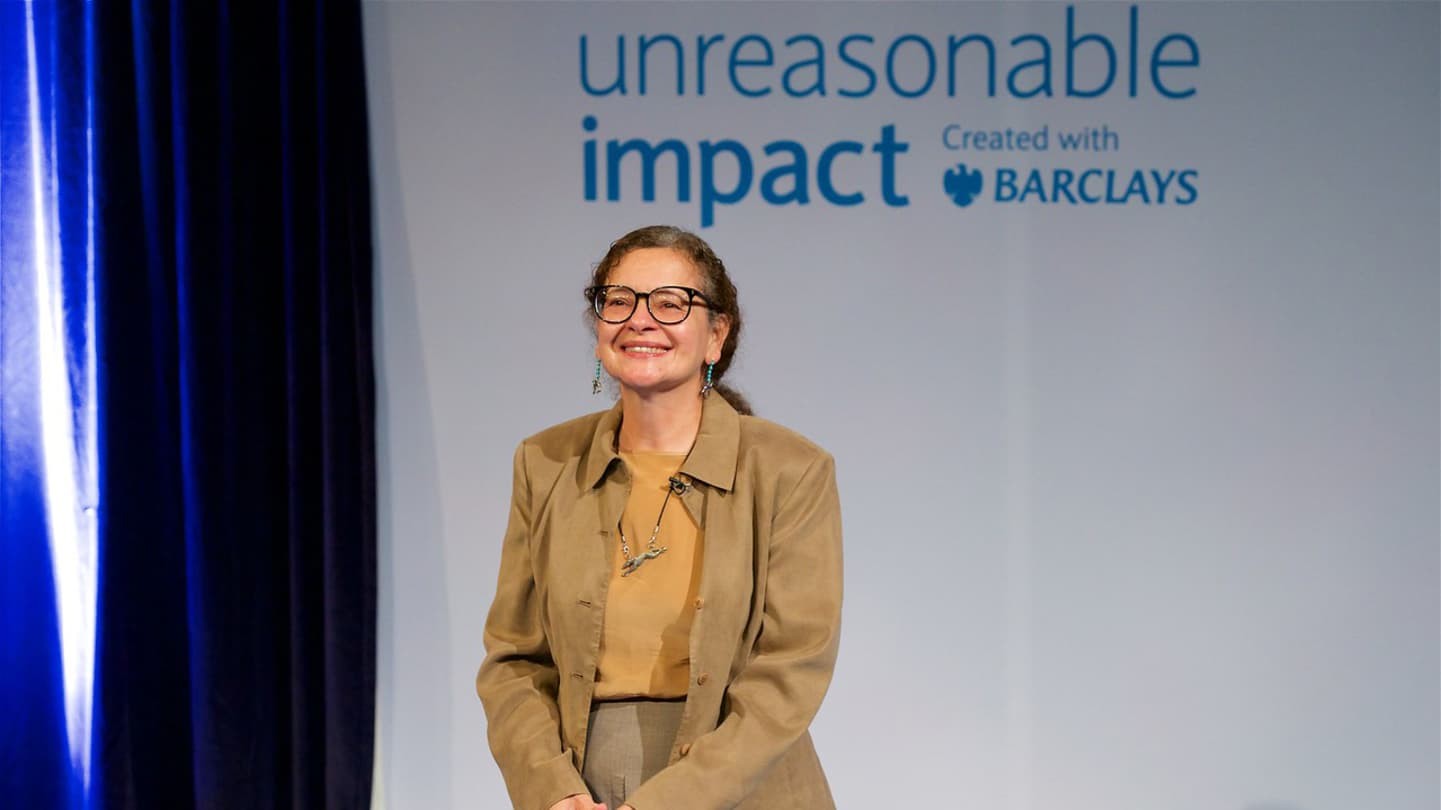
Growth
Flying high in a cleaner sky
Unreasonable Impact graduate LanzaTech is revolutionising the way the world thinks about carbon, by reusing waste to create low carbon chemicals and fuels. At the end of a breakout year for the company, we sat down with CEO Jennifer Holmgren to discuss the global crisis facing us, laying the foundations for future generations – and partnering with Sir Richard Branson.
In October last year, 14 years after building the company through pilots and demos, carbon-recycling company LanzaTech used its “alcohol-to-jet” aviation fuel to power a commercial flight from Orlando to London.
Speaking on the runway at the time, Virgin Atlantic founder Sir Richard Branson said: “Working with LanzaTech will enable us to drastically reduce our carbon emissions and at the same time, help support UK industry. That’s why we’re so excited to showcase this fuel on its first commercial flight as we plan for the world’s first full scale jet fuel plant using this amazing new technology.”
It was a huge step for the company that partnered with Boeing as well as Virgin Atlantic on the project, and – after opening a plant in China that converts steel mill waste gasses into ethanol – the big question is: what’s next?

Jennifer Holmgren, CEO of carbon-recycling company and Unreasonable Impact graduate LanzaTech
We believe that we can recycle carbon to the point where we can have a plant wherever there’s a steel mill or refinery in the world – wherever there’s waste carbon
According to LanzaTech CEO, Jennifer Holmgren – who joined the company in 2010 – around 35% of transport fuel could be made through gas fermentation using LanzaTech’s processes. That’s the equivalent of 7% of global CO2 emissions, or taking 700m passenger cars off the road.
“In the next year we’re building the capability to make 10 million gallons of jet fuel,” she explains. “We want one day to supply all of Virgin’s low-carbon fuel, and work with other airlines and other partners to grow this business.”
“Putting it another way,” Holmgren adds, “we’re turning our global carbon crisis into a feedstock opportunity with the potential to displace 18% of the crude oil in use today. We believe that we can recycle carbon to the point where we can have a plant wherever there’s a steel mill or refinery in the world – wherever there’s waste carbon.”
LanzaTech has discovered a way to make ethanol from carbon emissions from such factories, using a bacteria that originated from rabbit droppings to ferment the waste gas, generating ethanol. Holmgren describes the process as “a lot like making beer, except instead of converting sugar to ethanol, we convert pollution”. The product can then be mixed with gasoline to provide fuel for cars or planes, with over 70% greenhouse gas reduction compared to traditional jet fuel.
We’re turning our global carbon crisis into a feedstock opportunity with the potential to displace 18% of the crude oil in use today
Shai Weiss, CEO at Virgin Atlantic, says: “We were thrilled to be able to fly using the first batch of LanzaTech jet fuel last year, having worked tirelessly with Jennifer and the LanzaTech team for a number of years. It has been a pleasure partnering with LanzaTech to make flying more sustainable and we look forward to the next stage of this journey, bringing the technology to the UK.”
Holmgren plans to continue the partnership with Virgin Atlantic, highlighting their early leadership in the sector and that they have walked alongside LanzaTech throughout the development of the technology.
Branson himself has said that LanzaTech’s innovations are “a real game changer for aviation and could significantly reduce the industry’s reliance on oil within our lifetime. The future potential of this technology is enormous.”
“The value of the Unreasonable Impact network”
Founded in New Zealand in 2005 but now based near Chicago, Illinois, LanzaTech took part in the Unreasonable Impact Americas programme in November 2016. Holmgren says that the access to networks powered by Barclays has been hugely valuable: “What we’re doing is disruptive in terms of changing the carbon system, the energy system and the fuel system – we’re bringing a technology to market that nobody has ever done before or even imagined. On a journey that’s disruptive, you need people you can talk to who are going through similar thing
Who can you bounce ideas off? Who are you not afraid to share concepts with? Who are you not afraid to be called an idiot by?
“You need people who can develop and optimise your own thinking. Who can you bounce ideas off? Who are you not afraid to share concepts with? Who are you not afraid to be called an idiot by? That’s the value of the Unreasonable Impact network – a group of people who are daring to create new stuff.”
She continues: “Having large companies like Barclays believe in you is super valuable for little companies. Barclays has supported us with strategic thinking, opening doors, and getting into discussions with people. I don’t want to undersell cash, but knowledge and creating a brains trust is just as important.”
LanzaTech’s enviable ‘brains trust’ – or knowledge network – includes original investors Sir Stephen Tindall and co-founder of computer company Sun Microsystems, Vinod Khosla, as well as the connections made through Barclays’ Unreasonable Impact programme. Holmgren herself has over 20 years’ experience in the energy sector, and is the author of 50 US patents and 20 scientific publications.
Barclays has been sharing expertise and facilitating developments for the biotech firm, connecting the company with significant contacts they may not have had access to. Holmgren says: “Barclays set up a session for us inviting business executives and leaders from across multiple sectors. I couldn’t get those people into a room if I invited them, but Barclays facilitated that meeting to see what our shared values were and how we could get our sustainability goals. It’s an opportunity I wouldn’t have had if I was doing it myself, and it moves us forward, a little bit at a time.”
“It’s not just Barclays being a big name itself, it’s people from right across the business taking time to understand some of the key challenges and opportunities we have and then facilitating key introductions by saying ‘I want you to come and listen to their story’. And people respect their opinions, so they do just that.”